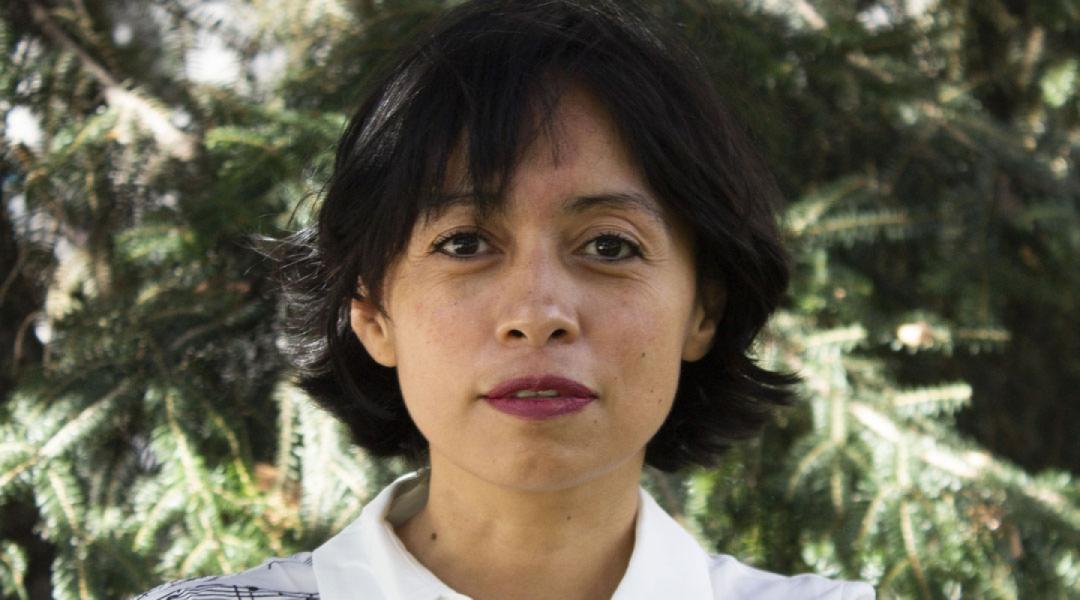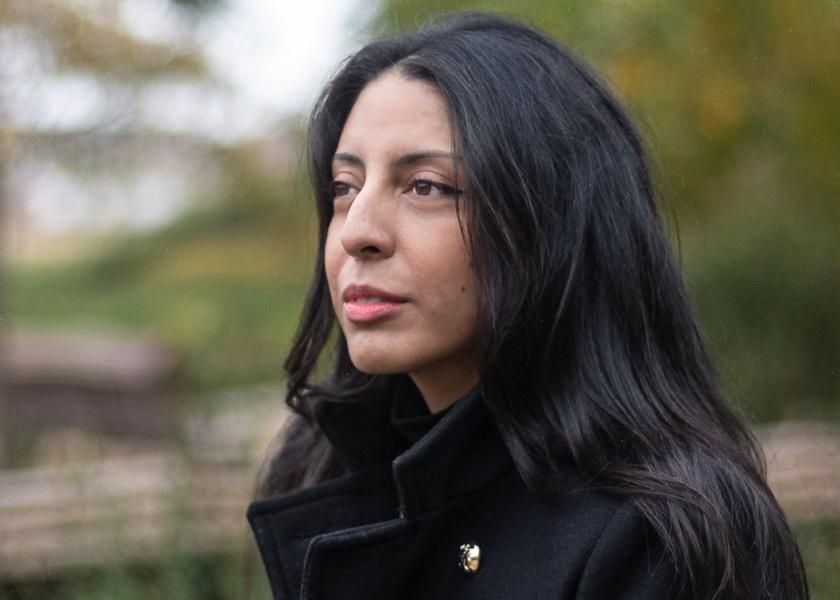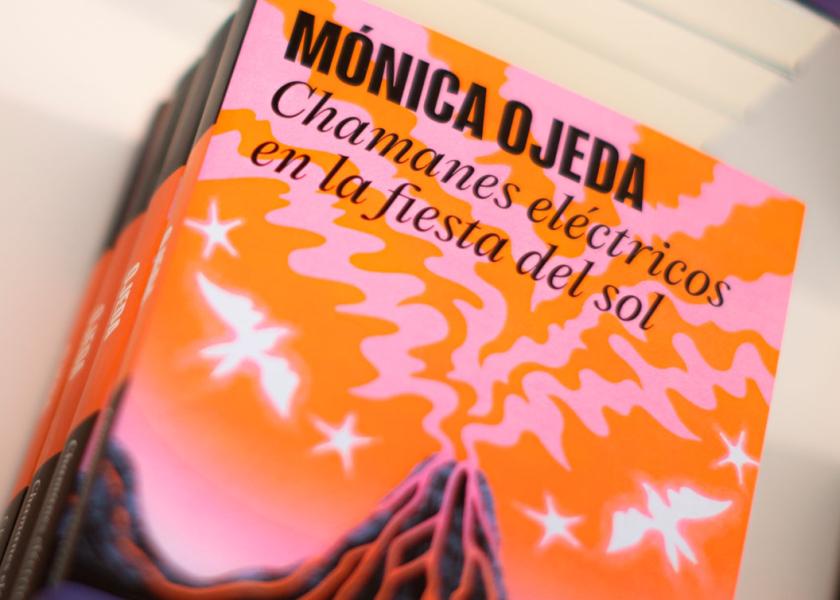Brenda Navarro
A Mexican from Madrid

With ‘A Mouthful of Ash’, a novel which will jump onscreen under the direction of her countryman Diego Luna, Mexican author Brenda Navarro has won readers over. Proof of this is the Book of the Year Award for Madrid Bookshops (Premio al Libro del Año para las Librerías de Madrid, 2022) she has won. Despite being in the final stages of writing her new book, this author who calls Madrid her home intends to meet readers and booksellers at the Madrid Book Fair: “It’s one of the events I enjoy the most in Madrid.”
Brenda Navarro (Mexico City, 1982) is Mexican through and through, although she also identifies as being Spanish, even from Madrid. “Why wouldn’t I? I also like C. Tangana and Spanish omelette,” she argues against those who deny her identity. This writer knows a lot about alienation, after starting over in Spain, just like the protagonist of her second novel: A Mouthful of Ash [Ceniza en la boca]. A book that, along with Empty Houses [Casas vacías], is part of a trilogy that, she divulges, is about to reach its peak: “I’m in the final stages of writing. It will close a trilogy that touches on the different forms of violence and oppression that women suffer. It’s a topic that’s always going to interest me, but with this book, it’s going to run its course, and I’m looking forward to writing about, what do I know, football (laughs).” As a writer and reader—her favourite role—she will visit the Ibero-American Pavilion of the Madrid Book Fair (30 May–15 June), an initiative promoted by Iberia to strengthen the presence of Ibero-American talent at the fair and raise awareness of the cultural wealth that brings us together. Also, under the title La cabina del libro [The Book Booth], the space will host a series of interviews with public figures from the literary world.
You studied sociology. How much of the sociologist is part of your identity as a writer?
The first rule in sociology is that you need to observe the world to try to understand it. I’ve always been interested in sociology because to tell stories, you need to understand the human condition. I also studied Feminist Economy, which helped me to understand the foundations that made me become a writer: that reality explained through sociology is not enough. Literature and fiction are the space where I can express what I learn from economics and social theorists.
Despite knowing the publishing industry well [she worked in this sector before becoming a writer], you published your first novel, Empty Houses, in PDF format through the platform Kaja Negra. Is it that hard to carve out a niche for yourself in the literary world?
I approached two publishers, one in Argentina and another in Spain—in Catalonia—because I didn’t want to publish in Mexico. I wanted my work to speak for itself and not be read because of my relationship with the publishing world. Those people told me: “There’s something in your novel.” That’s what I needed to hear. Since I understand the mechanisms of the publishing industry and I know how hard it is to get published, I thought I needed readers. I had a small community on Twitter, and I published it because I wanted to know whether people liked it or not. Luckily, they did.
“In Madrid, there are lots of Latin-American people nourishing the city and adding to its wealth”
A review by Fernanda Melchor helped get your literary career off the ground. Is there an emotional network between Latin-American female writers?
Yes. I will always be grateful to Fernanda because that changed the novel’s course. She also didn’t tell me; I just woke up one day and saw she’d made the recommendation. There was a time—between 2010 and 2020—when we female writers managed to build a community on social media. There are also geopolitical barriers in the publishing industry, and it’s really hard for a Latin-American book to be distributed in Spain and vice versa. What we writers did was take books we thought were worth it to fairs or festivals to give them to people who could be interested.
You belong to an acclaimed generation of Latin-American female writers, but your style is far from the school of magical realism that some of your contemporaries favour. Why?
I’ve never felt far away from magical realism. I’ve just spent a semester in Iowa teaching creative writing to young Americans, and I’d tell them: “What’s magical realism to you is everyday life for us.” Our mothers tell us that God watches over us, that ghosts exist, that they can talk to the dead... The thing is, my themes are always related to structural violence against women, with how each government or institutional decision directly affects their private lives. Maybe my literature is too materialistic in that sense.

‘A Mouthful of Ash' ['Ceniza en la boca'] and ‘Empty Houses' ['Casas vacías'], the novels published by Mexican writer Brenda Navarro. © Sexto Piso
Female themes are gaining literary traction thanks to writers like you. Even so, do you feel like there’s still a lack of voices?
More than a lack of voices, I feel like women are writing about lots of topics, but they keep putting us in the “female literature” box and that reduces our visibility. I hope my tombstone says: “Finally, we’re told we write just literature, without adjectives.” If Agota Kristof, who is the best writer who described 20th-century Europe, were published today, someone would say: “You’re talking about two children being orphaned.” And that’s not the case; she’s talking about European war and violence. What I don’t like, to be honest, is for publishers (and I’m not pointing any fingers) to say: “Now write a book about motherhood.”
Ibero-American literary talent gets connected at the Madrid Book Fair. For you, born in Mexico but settled in Spain years ago, how important are the connections between Spain and Latin America?
Super important. Since I started talking about my work, which is related to Mexico—but also to Spain—, I’ve sought to overcome stereotypes. I’m interested in having a conversation with Spain, which is where my family lives, and we have a crucial tool to do so: the Spanish language. A tool that can be used to break down barriers and build more intelligent societies through conversation. I always say that I was born in Mexico, but I’m also Spanish and from Madrid. In Madrid, there are lots of Latin-American people nourishing the city and adding to its wealth. This is why there being an Ibero-American Pavilion at the Madrid Book Fair is very interesting.
You’ve visited the Book Fair as a writer but, as someone who calls Madrid her home, you’ve probably also done so as a reader. Which side do you prefer?
I prefer to visit the fair as a reader because I find a universe full of fascinating books. However, as an author I have to talk about myself and that’s really boring (laughs). The booksellers at the Fair are wonderful, they greet me and invite me into their booths... I feel embraced by them!
“It’s a treat to know that something you wrote touches other people. If there’s one thing that interests me in life is having conversations and I did it through books”
“Most of my inspiration comes from the news,” Almodóvar confessed once. Something similar happened to you with A Mouthful of Ash, right? Where do you look for or find inspiration?
Always on the street, much more than in books. I love to go for walks, observe and listen to people. Sometimes I’m walking along the street and I hear a phrase that sets me off. Do you know what happened with A Mouthful of Ash? I was on the metro listening to a working-class Latin-American woman talking on the phone to someone from her country and I felt a pang in my stomach because I knew she was in Madrid, on the metro with me, but her head was somewhere else. It shook me. Then I connected with the story of that boy who, unfortunately, died by suicide. I thought that it was related to physically inhabiting one place, but being somewhere else... With that nostalgia, that unbelonging.
Diego Luna has directed the film adaptation of A Mouthful of Ash. And Empty Houses was adapted for the theatre. How do you feel about other people shaping your material?
I love it! It’s a treat to know that something you wrote touches other people. I think I already won, right? If there’s one thing that interests me in life is having conversations and I did it through books. I feel very fortunate that Diego or Mariana decided to have a conversation with my work and make it their own, they made their own interpretation and that’s what’s interesting. There’s nothing more important for someone developing an artistic discipline than to see people making your work their own; in a way, it stops belonging to you.


